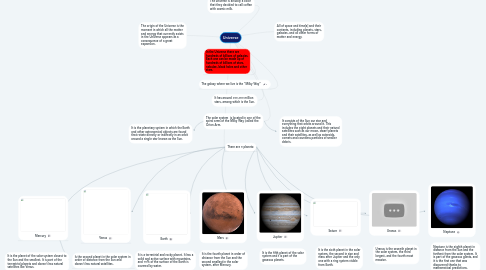Universe
by Marifer Rosas

1. It is a terrestrial and rocky planet. It has a solid and active surface with mountains, and 70% of the surface of the Earth is covered by water.
2. Is the second planet in the solar system in order of distance from the Sun and doesn´t has natural satellites.
3. Venus
4. It is the planet of the solar system closest to the Sun and the smallest. It is part of the terrestrial planets and doesn´t has natural satellites like Venus.
5. Mercury
6. There are 8 planets:
7. It is the planetary system in which the Earth and other astronomical objects are found that rotate directly or indirectly in an orbit around a single star known as the Sun.
8. The solar system is located in one of the spiral arms of the Milky Way (called the Orion Arm.
9. It has around 200,000 million stars, among which is the Sun.
10. The galaxy where we live is the "Milky Way"
11. The universe is actually a color that they decided to call coffee with cosmic milk.
12. The origin of the Universe is the moment in which all the matter and energy that currently exists in the Universe appears as a consequence of a great expansion.
13. In the Universe there are hundreds of billions of galaxies. Each one can be made up of hundreds of billions of stars, nebulae, black holes and other stars.
14. Earth
15. Mars
16. It is the fourth planet in order of distance from the Sun and the second smallest in the solar system, after Mercury.
17. It consists of the Sun our star and everything that orbits around it. This includes the eight planets and their natural satellites such as our moon, dwarf planets and their satellites, as well as asteroids, comets and countless particles of smaller debris.
18. All of space and time[a] and their contents, including planets, stars, galaxies, and all other forms of matter and energy.
19. Jupiter
20. It is the fifth planet of the solar system and t is part of the gaseous planets.
21. Saturn
22. It is the sixth planet in the solar system, the second in size and mass after Jupiter and the only one with a ring system visible from Earth.
23. Uranus
24. Uranus is the seventh planet in the solar system, the third largest, and the fourth most massive.
25. Neptune
26. Neptune is the eighth planet in distance from the Sun and the farthest from the solar system. It is part of the gaseous giants, and it is the first one that was discovered thanks to mathematical predictions.


